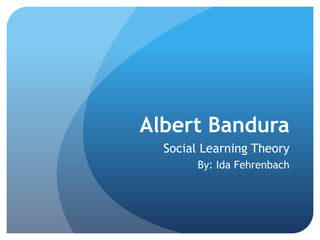Bandura and Social Learning Theories
•Transferir como PPTX, PDF•
26 gostaram•49,009 visualizações
Brief explanation and classroom application of Albert Bandura's social learning theory.
Denunciar
Compartilhar
Denunciar
Compartilhar

Recomendados
Recomendados
Mais conteúdo relacionado
Mais procurados
Mais procurados (20)
Destaque
Destaque (11)
Lev Vygotsky’s Socio-Cultural Theory of Cognitive development

Lev Vygotsky’s Socio-Cultural Theory of Cognitive development
Semelhante a Bandura and Social Learning Theories
Semelhante a Bandura and Social Learning Theories (20)
Social psychological theories of aggression - SLT A2

Social psychological theories of aggression - SLT A2
Último
This presentation was provided by William Mattingly of the Smithsonian Institution, during the fourth segment of the NISO training series "AI & Prompt Design." Session Four: Structured Data and Assistants, was held on April 25, 2024.Mattingly "AI & Prompt Design: Structured Data, Assistants, & RAG"

Mattingly "AI & Prompt Design: Structured Data, Assistants, & RAG"National Information Standards Organization (NISO)
APM Welcome
Tuesday 30 April 2024
APM North West Network Conference, Synergies Across Sectors
Presented by:
Professor Adam Boddison OBE, Chief Executive Officer, APM
Conference overview:
https://www.apm.org.uk/community/apm-north-west-branch-conference/
Content description:
APM welcome from CEO
The main conference objective was to promote the Project Management profession with interaction between project practitioners, APM Corporate members, current project management students, academia and all who have an interest in projects.APM Welcome, APM North West Network Conference, Synergies Across Sectors

APM Welcome, APM North West Network Conference, Synergies Across SectorsAssociation for Project Management
Último (20)
Ecosystem Interactions Class Discussion Presentation in Blue Green Lined Styl...

Ecosystem Interactions Class Discussion Presentation in Blue Green Lined Styl...
Web & Social Media Analytics Previous Year Question Paper.pdf

Web & Social Media Analytics Previous Year Question Paper.pdf
Disha NEET Physics Guide for classes 11 and 12.pdf

Disha NEET Physics Guide for classes 11 and 12.pdf
Mattingly "AI & Prompt Design: Structured Data, Assistants, & RAG"

Mattingly "AI & Prompt Design: Structured Data, Assistants, & RAG"
Measures of Central Tendency: Mean, Median and Mode

Measures of Central Tendency: Mean, Median and Mode
Presentation by Andreas Schleicher Tackling the School Absenteeism Crisis 30 ...

Presentation by Andreas Schleicher Tackling the School Absenteeism Crisis 30 ...
Call Girls in Dwarka Mor Delhi Contact Us 9654467111

Call Girls in Dwarka Mor Delhi Contact Us 9654467111
Kisan Call Centre - To harness potential of ICT in Agriculture by answer farm...

Kisan Call Centre - To harness potential of ICT in Agriculture by answer farm...
APM Welcome, APM North West Network Conference, Synergies Across Sectors

APM Welcome, APM North West Network Conference, Synergies Across Sectors
Bandura and Social Learning Theories
- 1. Albert Bandura Social Learning Theory By: Ida Fehrenbach
- 2. About Albert Bandura • Born on December 4, 1925 • Canadian, American • Studied at University of British Columbia and University of Iowa. Researched and taught at Stanford University. • Elected president of American Psychological Association in 1974 • Famous for research on social learning theories
- 3. What is social learning? Remember the saying monkey see monkey do? Same concept! Observational learning: Watching actions performed either in a form of media of in real life then mimicking the observed behavior. Bandura’s concept of regulation of human behavior is found in the diagram of triadic reciprocal causation. Behavioral, cognitive and environmental factors all influence learning behavior.
- 4. Research Experiments Bobo the clown Boys and girls watched a video of a person performing violent acts on a blowup clown named Bobo. Use of kicking, punching, and hammering were modeled. When children were then left alone with the same blowup clown they performed the same behaviors they had observed. Watch Bandura and the Bobo experiement
- 5. Still Images from Bobo experiment
- 6. What this means for educators • Model appropriate behaviors for a school environment, realize that your students are watching you constantly. • Watch and listen critically to audiovisuals before using in class. • Do not underestimate how quickly children learn from what they observe! • A funny example...
- 7. Key Concept: Self-Efficacy A person’s belief that they can successfully perform behaviors that will produce desired effects. Judgment of personal capacity. Typically people will not try to do things they do not believe they can do. Self concept arises from past accomplishments. Contribute to academic confidence and success.
- 8. What this means for educators It is important to foster the development of self- efficacy. Create a sense of empowerment in the classroom. Challenge students, and always maintain confidence in their abilities to rise above challenges. Tell them this! Celebrate and acknowledge when children perform to the best of their ability and conquer challenges.
- 9. Applying Bandura’s theories in the classroom Carefully select audiovisuals that are to be used in the classroom. Create a sense of collective-efficacy by emphasizing team work. Set goals for students to accomplish, have them keep a record of these accomplishments. Once a month take the record out and celebrate their hard work. Incorporate technology by putting the students' challenges and accomplishments online on the class website so they can show their friends and family.
- 10. Works Cited Engler, Barbara. Personality Theories: An Introduction. Boston, MA: Houghton Mifflin, 2009. Print. Shelly, Gary B., Glenda A. Gunter, and Randolph E. Gunter. Teachers Discovering Computers: Integrating Technology in a Connected World. Boston, MA: Course Technology Cengage Learning, 2012. Print.